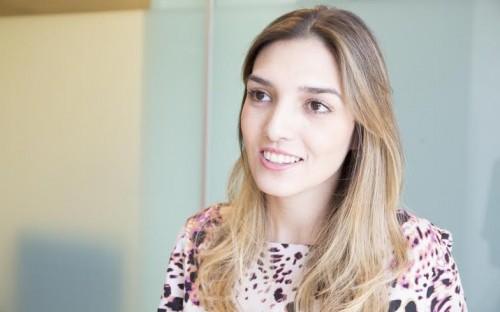Just three months into the full-time MBA, Reis secured the internship that would lead to a job offer that fulfilled all of her pre-MBA ambitions: making the triple jump of industry, function and location.
Reis, who graduates from the two-year full-time MBA program this summer, has looked back at the goals she wrote down in her application: “My goal was to be a leader in a consumer products company in a Brazilian multinational, and that is exactly what I'm pursuing right now.”
Among MBA students, the triple jump is widely considered the toughest career transition to achieve. “It’s common that people figure out what they want to do during business school… [but] if you really want to do the triple jump it’s better if you know it beforehand,” says Reis.
In Reis’s case, knowing early on that she wanted to make the triple jump helped her take advantage of an opportunity that presented itself early in her Chicago Booth journey: her admissions interview.
Candidates who are invited for interview have the choice of either being interviewed at the Chicago campus, by current students, or in their home country by Chicago Booth alumni. Reis was interviewed in Sao Paulo by Pedro Faria, CEO of BRF, a $13 billion food manufacturer and one of Brazil’s biggest multinational firms, with operations all around the world. Pedro Faria is also a Chicago Booth alum (’02), and a member of the school’s board for the Americas.
“I was incredibly lucky to have him as my interviewer when I applied to Booth,” says Reis. “I had an hour to talk to him and I kept in touch.” Reis landed a summer internship at BRF’s Sao Paulo headquarters in January 2015, just three months into her MBA program. “This would never have happened without the Chicago Booth network,” she says.
While Reis admits that she was lucky to have been interviewed by the CEO of one of her dream employers, she emphasizes that the Chicago Booth name opens a lot of doors for all MBA students. “It’s so much easier to talk to someone if you’re a Booth student, not only within the alumni community, but in a lot of companies.”
Chicago Booth also offered her many other opportunities to learn about the food industry, notably through FEAD, the Food Environment, Agribusiness and Development Group, which holds regular speaker and networking events.
Reis spent the summer of 2015 on an internship at BRF, in the firm’s Strategic Planning department in Sao Paulo. While working on a three-year business development plan, Reis collaborated closely with the BRF Middle East regional team based in Dubai. The Middle East accounts for a third of BRF’s business and Reis was keen to learn more about how the firm had built its brand in the region. After a short time she was asked to transfer to the Dubai office to complete her internship, and moved there at two days’ notice.
Before embarking on the Chicago Booth MBA, Reis worked as an investment banking analyst at two major Brazilian banks. Then, immediately prior to her MBA, Reis was founder and CEO of Tripda, a car-pooling platform launched by the prestigious Rocket Internet incubator. As well as setting up her next career step, Reis says that Chicago Booth MBA courses gave her profound insights into the work she had already done.
One of her favorite classes was The Firm and the Non-Market Environment, with Professor Marianne Bertrand, which focused on how non-market entities such as the government, regulators, media and NGOs influence businesses. Early on, the class looked at a case study of Uber’s launch in Washington, DC, and analyzed the different strategies through which the firm could have achieved its goals. “When I finished the class I thought, ‘Wow, I wish I could have had those three hours two years ago. It would have helped me assess my business plan much more effectively.’”
Reis has spent a considerable amount of her free time supporting the admissions process for the incoming class of MBAs, including conducting interviews. Her advice to MBA applicants is to focus on three key questions, “both for the people who are interviewing you and for yourself.” The questions are:
1. Why do you need an MBA? A lot of people are successful without one, so why do you need it and how will it add value to your life?
2. Why is now a good time for an MBA? Depending on your work experience, there are some points in life when an MBA makes sense.
3. Why is Chicago Booth the best fit for you?
If you know the answer to these questions, says Reis, it will be much easier to write the admissions essays. “The application process is long and hard,” she says. “You should put 110% into it.”
Student Reviews
The University of Chicago Booth School of Business
RECAPTHA :
d4
5e
55
55







